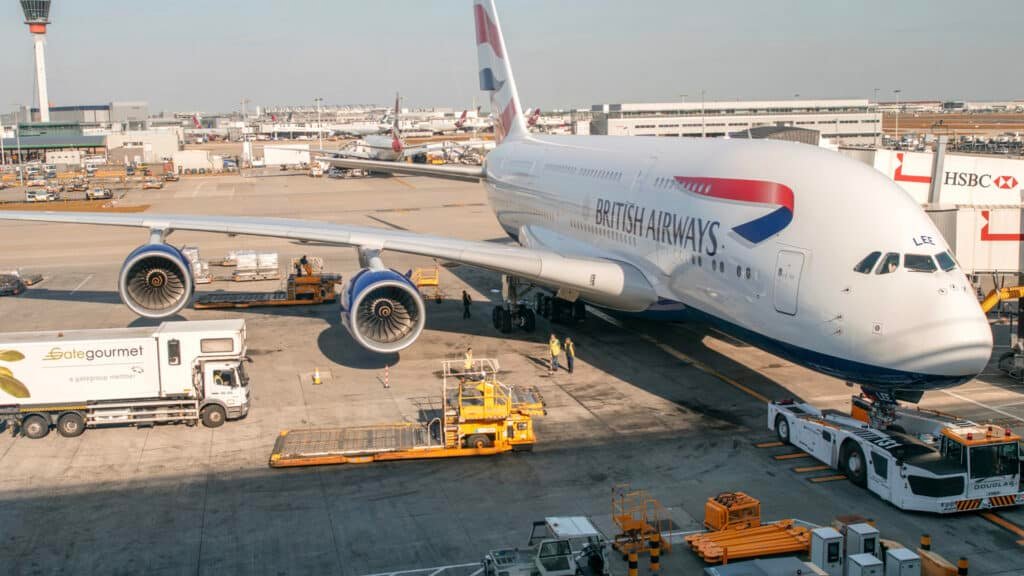A senior airline captain has been caught red handed stealing food from British Airways…shocking to many people in the travel industry.
In a stunning breach of trust that has left aviation insiders shaking their heads, a veteran British Airways Airbus A380 training captain, one of the airline’s most senior and well-compensated pilots, has been caught red-handed systematically stealing food and beverages from the company’s headquarters café.
The embarrassing incident unfolded at British Airways’ Waterside headquarters, where CCTV cameras captured the captain repeatedly helping himself to items from the self-service “pavement café” without paying. The establishment operates on an honor system, expecting staff to check themselves out and pay for sausage rolls, sandwiches, chips, cookies, coffee, and other refreshments.
A Career Built on Trust
As an A380 training captain, this pilot represents the pinnacle of commercial aviation expertise, therefore should have the trust of the crew and the passengers.
The captain has been employed with British Airways for over two decades and earns approximately £170,000 per year, placing him among the airline’s highest-paid employees. His role involves training other pilots on the world’s largest passenger aircraft, requiring him to spend a good amount of time at headquarters rather than at airports, which explains his frequent presence at the pilfered café.
The A380, British Airways’ flagship aircraft, represents the airline’s most complex and prestigious flying assignment. It is a complex beast with some of the coolest features like the famous shower on the Emirates A380. Training captains must possess exceptional technical knowledge, leadership skills, and impeccable judgment, qualities that make this incident particularly jarring for industry observers. The addition of the fact that he makes a lot of money, and needs to steal tiny items of food baffles me as I read the headlines.
Caught in the Act
The captain was caught on CCTV repeatedly taking items without paying, essentially treating the café as his personal pantry. When confronted by management about his behavior, the captain was called into a manager’s office to explain why he had consistently bypassed the payment process.
The theft appears to have been part of a broader pattern of dishonesty at the self-serve facility, prompting British Airways to review security measures and take action against multiple employees caught abusing the honor system.
A Slap on the Wrist
Perhaps most shocking to industry watchers is the lenient response from British Airways management. Despite the repeated nature of the theft, the captain received only a warning, no suspension, fine, or termination. It is plain slap on the wrist to someone who thinks they are unfireable. Smells of arrogance from the pilot and weakness from the company. This gentle treatment stands in stark contrast to how the airline typically handles misconduct by lower-ranking employees.
Industry sources suggest that if this had been a flight attendant committing similar theft, termination would have been swift and certain, even for fewer infractions. The differential treatment highlights the practical realities airlines face: replacing a specialized A380 training captain requires months of preparation and significant expense, while cabin crew can be more easily substituted. At least cut his pay for the next few months. What are these companies really teaching about honor?
The incident raises uncomfortable questions about accountability and double standards within the aviation industry. As one critic noted, “If the pilot can’t be trusted to pay for his food at a café with the honor system, then how can he be trusted with hundreds of lives in an airplane?”
Industry Context
British Airways has faced numerous personnel challenges in recent years, from labor disputes to high-profile misconduct cases. The airline industry’s rigorous safety culture depends fundamentally on trust and integrity at every level, making any breach of ethical standards particularly concerning.
The captain’s behavior becomes even more puzzling when considered against his substantial compensation package. British Airways pilots receive competitive salaries, comprehensive benefits including up to 15% employer pension contributions, discounted travel privileges, and various allowances. For someone earning £170,000 annually, approximately $230,000 USD, the financial motivation for stealing café items worth pennies defies rational explanation.
Let’s face the reality, the captain could be just super cheap.
The Bigger Picture
This incident reflects broader challenges facing corporate culture in high-stakes industries. Honor-system arrangements depend on institutional trust and personal integrity, qualities that become meaningless when senior leaders model dishonest behavior. The captain’s actions don’t just represent theft; they demonstrate a fundamental disrespect for the principles that underpin aviation safety culture.
The contrast with international standards is stark. Emirates A380 captains earn comparable salaries of approximately $171,589 tax-free annually, while maintaining rigorous professional standards. The incident may prompt British Airways to reconsider both its internal security measures and disciplinary procedures.
What’s Next?
While the captain received only a warning, the incident has reportedly been documented in his personnel file. Aviation careers depend heavily on trust and reputation, qualities that can take decades to build and moments to destroy. Whether this lapse in judgment will affect his future prospects within British Airways or the broader aviation industry remains to be seen.
The case also highlights the need for airlines to balance practical considerations, such as the difficulty of replacing specialized personnel with the imperative to maintain ethical standards. As the aviation industry continues to rebuild trust with the traveling public following various crises, incidents like this underscore the importance of consistent accountability at every organizational level.
For British Airways, the episode serves as an uncomfortable reminder that integrity cannot be assumed, regardless of rank or salary. In an industry where split-second decisions can mean the difference between life and death, the character of those in command matters more than their technical qualifications alone.
